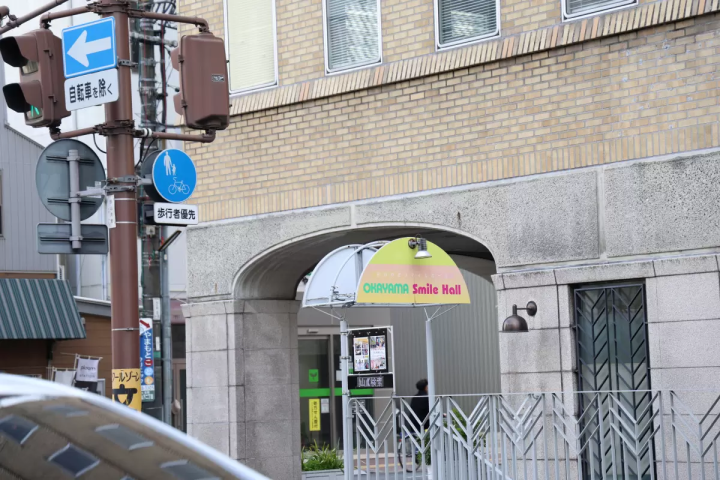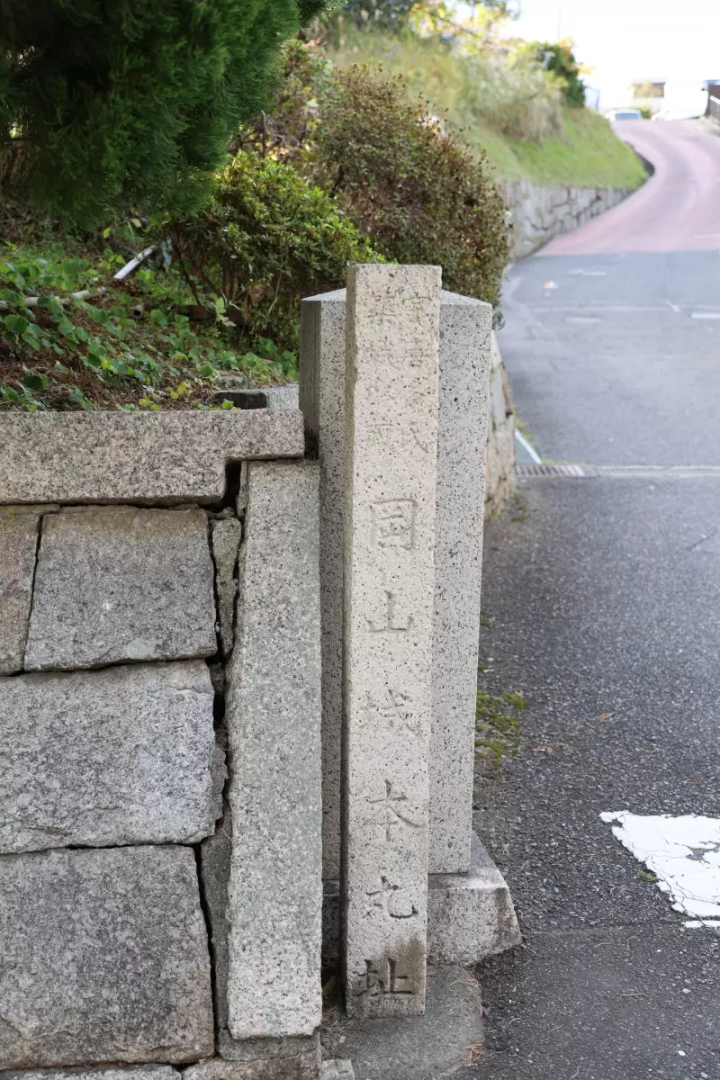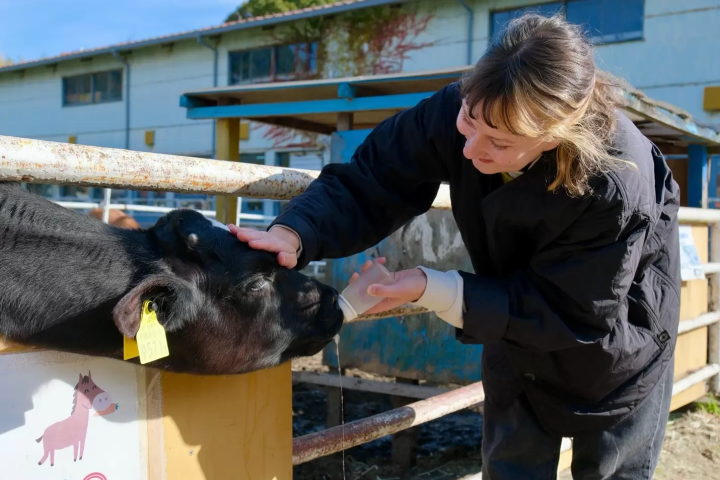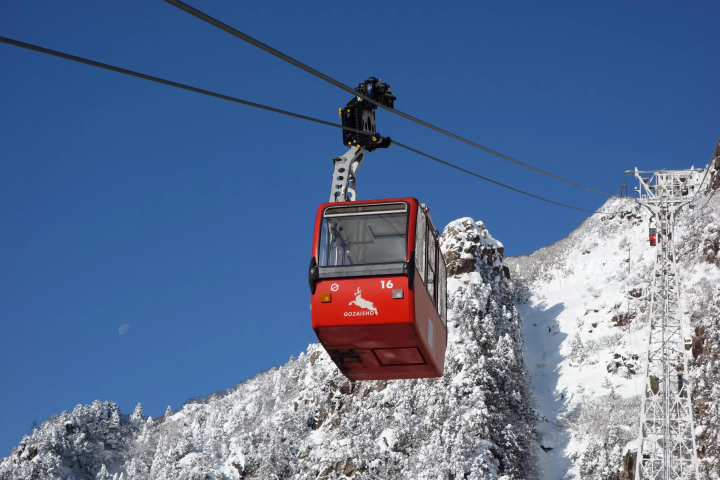A new ally for tourism! A flexible tour of Okayama City with " ECYC "

The French-made three-wheeled bicycle "ECYC" is a new sightseeing and transportation service. It introduces you to hidden spots and popular local shops that aren't listed in guidebooks, allowing you to efficiently enjoy sightseeing in the center of Okayama City!
-
Table of contents
- "ECYC" debuts! Heading to the boarding area
- An in-house venture originating from a local department store
- Okayama Smile Hall, which was also used as a filming location for the movie
- Okayama Prefectural Office, the first government building designed by Kunio Maekawa
- Okayama Castle's Uchigemamon Gate and Meinbashi Bridge
- The remains of Okayama Castle, located in an alley in a residential area
- The charm of Okayama Castle Tsukimi Tower
- ECYC's service #1: Photo service
- ECYC Service No. 2: Request a place you want to go
- Okayama Momotaro Street
"ECYC" debuts! Heading to the boarding area

"ECYC" is a transportation service that uses the French-made "Cyclopolitain," and its name is a combination of "Ethical," meaning environmentally friendly, and the name of the vehicle itself, "Cyclopolitain." I headed to the boarding point, excited to see what kind of experience it would be. When you leave the East Exit of Okayama Station, the boarding point is behind the Don Quijote Okayama Ekimae store, right in front of you. When making a reservation in advance, you can specify a boarding and disembarking location near the East Exit of JR Okayama Station, so even first-time visitors to Okayama can use the service with peace of mind.
Now, let's head to our destination!

Leaving the bus stop, we headed down Haremachi Street from the intersection where AEON MALL Okayama is located towards the prefectural office. ECYC rides his three-wheeled bicycle along the road, but as there are no doors or windows, it feels incredibly open. We were able to borrow a warm lap blanket, and with gloves, a knit cap and a scarf, the December breeze felt pleasant. It was a refreshing experience, different from the view from a car and different from the perspective of a pedestrian.
An in-house venture originating from a local department store

From the back seat of the ECYC, you can discover interesting manholes and other things, and the car can even stop to take a look around. As you drive along Haremachi Street, you'll come across Okayama's department store, Tenmaya Okayama Main Branch. ECYC is a business launched by Tenmaya as an in-house venture, and the driver, Nomura, is also the initiator of the project. Of all his travel experiences, he says he was particularly impressed by vehicles that let him feel the "breeze" of tourist spots, and this became the starting point for his trip.
Okayama Smile Hall, which was also used as a filming location for the movie

Okayama Smile Hall was used as a filming location for the movie "If My Favorite Idol Came to Budokan, I'd Die" and remains a popular sacred place to this day. It is also known as the base of operations for Okayama's local idols.
"If My Favorite Idol Made It to Budokan, I'd Die" Filming Locations in Okayama| Okayama Tourism Web
Okayama Prefectural Office, the first government building designed by Kunio Maekawa

The Okayama Prefectural Office was the first government building designed by Kunio Maekawa, who worked for the world-renowned architect Le Corbusier. The wall panels have creases to give them character, making them look like chocolate bars.
Okayama Castle's Uchigemamon Gate and Meinbashi Bridge

Uchigemamon Gate was Okayama Castle's main gate, connecting the lower Honmaru and Ninomaru. The Aimanbashi Bridge, which spans the moat, was used as a defense in the event of an enemy invasion by lowering the wooden bridge. You can also walk to Okayama Castle from here. On the other hand, Sotogemamon Gate is located on the Okayama Prefectural Library side, where the outer moat of the castle once stood. The Ishigaki still remain, allowing you to feel the atmosphere of the past.
The remains of Okayama Castle, located in an alley in a residential area

The current Okayama Castle was relocated, and the original castle site is now located in a residential alley. The ECYC can also travel through narrow alleys, making it an ideal place to explore the remains of the castle's past.
The charm of Okayama Castle Tsukimi Tower

You can get up close to the Tsukimi Tower behind Okayama Castle by ECYC. The Ishigaki of the Tsukimi Tower were built in the 1620s by Ikeda Tadao, the second lord of the Bizen Okayama domain, and are made from stone quarried from Inujima(Okayama City ) in the Seto Naikai . Inside, you can see a stone seal engraved with the shape of a circle and a plus sign.
ECYC's service #1: Photo service

As part of the ride's services, you can have your photo taken with Okayama Castle in the background. Even if you're traveling alone, you can take a commemorative photo of your trip to Okayama.
Tsukimi Bridge and Peach Boat

We head home from here, passing by Tsukimi Bridge, which connects Okayama Castle and Okayama Korakuen Garden. The peach-shaped boat floating on the Asahikawa River below Tsukimi Bridge is a popular pedal boat inspired by Okayama's Momotaro legend.
At your feet is a Momotaro manhole cover

Manholes unique to Okayama Prefecture, famous for the Momotaro legend, are scattered throughout the city.
ECYC Service No. 2: Request a place you want to go

Another feature of this service is that you can have the driver wait for you and stop by stores along the way. On the way back to the station from Okayama Castle, we stopped by the "Specialty store of Okayama, the Land of Sunshine" in the Omotemachi shopping arcade. The store has the recently introduced "Okayama New Discovery! GACHA" where you can win a total of seven acrylic key chains exclusive to Okayama, including Momotaro manholes and peach boats. We tried our hand at gacha together with our driver, Nomura.
"Okayama New Discovery! GACHA" Official Website
Yellow chives and Gon-chan

I won "Gon-chan," the character for the Tsuyama Gongo Festival, and Nomura won "yellow chives," which originate in Okayama Prefecture and boast about 70% of the nation's production. It was so much fun that I wanted to try again and again. It was a cashless gacha, and I paid with PayPay. "Specialty store of Okayama, the Land of Sunshine " has a Toyotomi of Okayama 's specialty products, making it the perfect place to choose souvenirs.
Specialty store of Okayama, the Land of Sunshine| Okayama Tourism WEB
Okayama Momotaro Street

On the way back, we walked along Momotaro Street, which was beautifully decorated with autumn leaves, towards JR Okayama Station. The view from the road along the main street, where trams and buses also pass by, was a fresh and thrilling experience. The autumn leaves were at their peak late that day, and the view from the road was breathtaking.
If you have limited time to explore Okayama City, we recommend the highly mobile ECYC. It was a wonderful experience, allowing you to enjoy the cityscape up close while feeling the breeze, just like an attraction!
[ECYC]
Opening hours: October to March: 9:00 to 17:00, April to September: 10:00 to 18:00
*No reservations are required and you can board by raising your hand from anywhere.
*Pick-up available within the operating area
Closed: Tuesdays, when it rains Capacity: 2 people (excluding the driver)
Charge: 500 yen per vehicle (initial fare + 500 yen for every 500m thereafter)
TEL: 080-8985-5869
Email: ecyc@tenmaya.co.jp
Other: Advance reservations accepted by phone or via the website
Okayama Prefecture is located in the Center of Western Japan and is known as the "Land of Sunshine" due to its warm climate and little rain throughout the year. It's conveniently located halfway between famous tourist destinations like Kyoto, Osaka, and Hiroshima! It's also the gateway to Shikoku via the Seto. Okayama is also known as the "Fruit Okayama," and the fruits that are sun-drenched in the warm climate of the Setouchi are of the highest quality in terms of sweetness, aroma, and flavor. You can enjoy seasonal fruits such as white peaches, Muscat grapes, and Pione grapes! Okayama is also home to world-class tourist spots, including Okayama Castle, Okayama Korakuen Garden, one of Japan's three most famous gardens, and Kurashiki Bikan Historical Quarter, which boasts history, culture, and art!
The contents on this page may partially contain automatic translation.






























![[Company Visit List] Learn from Japanese Business Leaders: Factory Tours & Corporate Visits in Southern Osaka Featuring Manufacturing Technology and Management Philosophy](https://resources.matcha-jp.com/resize/720x2000/2024/12/13-215168.webp)
![[Recommended accommodation in Ureshino Onsen] 1.5 hours from Hakata Station! Enjoy Japanese tea and skin-beautifying hot springs at Saga Ureshino Onsen URESHINO YADOYA](https://resources.matcha-jp.com/resize/720x2000/2025/06/14-236549.webp)


![[Kagoshima] Overcoming 12 Years of Hardship: Walking through Minamisatsuma City, the sacred land where the monk Ganjin landed](https://resources.matcha-jp.com/resize/720x2000/2026/02/21-259481.webp)